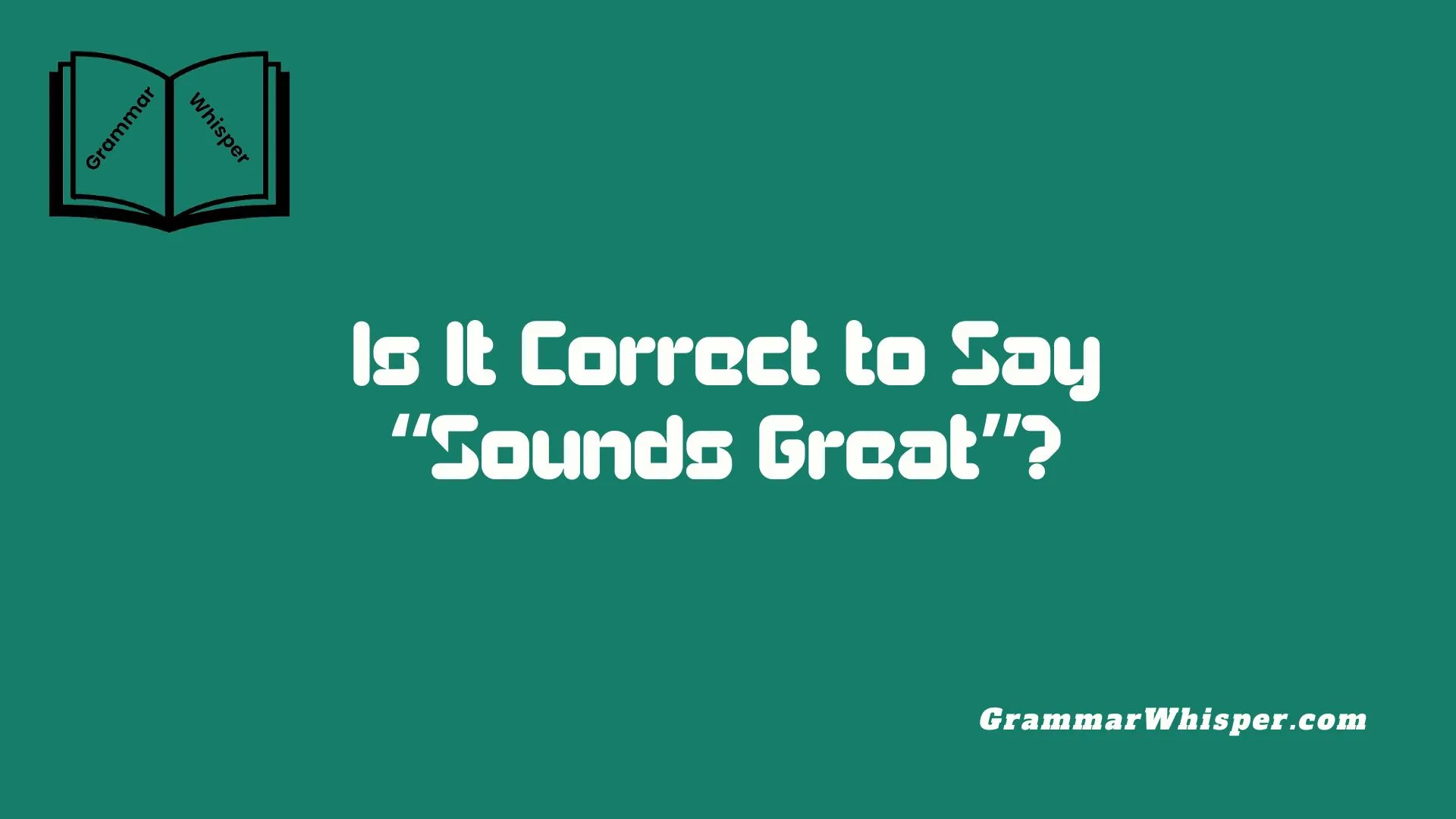Every day, people hear their friends and colleagues casually say “Sounds Great” without giving it a second thought. It seems like an innocent phrase, yet the nuance it carries is far deeper than most realize. When you use this familiar pair of words, it often Signals an enthusiastic agreement or Conveys politeness in quick conversations and casual chats. Over dozens of times daily, you might have noticed how smoothly it Adapts in emails, texts, or even in professional work exchanges. As a native speaker, you may find that saying it just feels natural, regardless of whether the context is formal or relaxed.
Whenever someone writes “Sounds Great” in a message, it immediately tells others the plan to respond positively. This short guide explains how learning to wield phrases like a local helps you blend in effortlessly. I often unpack these simple layers when teaching students the right way to sound polite and confident. Knowing when to drop a friendly “Sounds Great” keeps your tone warmer and your intent clearer.
What Does “Sounds Great” Really Mean?
From Literal Hearing to Idiomatic Agreement
Literally, “sounds great” refers to something you hear that you like. But idiomatically, it’s shorthand for approval:
“Your idea sounds great!” Meaning: I agree, I like it.
This picks up shades of enthusiasm, politeness, or optimism, depending on context.
Tone, Intent & American English Usage
Two people may say “sounds great,” but convey different moods:
- Bright + Energetic: “Let’s meet at noon.” → “Sounds great!” (I’m excited!)
- Polite + Neutral: “I’ll finish the report by Friday.” → “Sounds great.” (Acknowledging the plan.)
In American English, it’s a concise tool to signal “I’m on board” – casual, friendly, flexible.
Is “Sounds Great” Grammatically Correct?
Absolutely. Here’s why: Phrase structure: Sound Verb + Acting Adjective
Sounds – linking verb, Great – predicate adjective. It forms: Subject + Verb + Adjective (just like “She seems happy.”)
Subject – Verb Agreement
- She sounds great. (singular subject → “sounds”)
- They sound great. (plural → “sound”)
When does “sound great” appear?
It shows up when the subject is plural or there’s no explicit subject:
- “These ideas sound great.”
- “Sound great, guys?” (casual plural “you”)
Comparison Table: ‘Sounds Great’ vs. ‘Sounds Great’
| Phrase | Subject Type | Typical Use |
| Sounds great | Singular/It | “That song sounds great.” |
| Sound great | Plural/Implicit | “These plans sound great.” |
| That sounds great | Demonstrative | Adds clarity; good in writing and spoken English |
Everyday Scenarios Where “Sounds Great” Fits Perfectly
Let’s see real-world uses:
Accepting Invitations
- “Want to grab coffee tomorrow?” → “Sounds great!”
- Tone: enthusiastic and friendly.
Agreeing to Ideas or Plans
- “Shall we move the deadline to Monday?” → “Sounds great.”
- Tone: supportive and positive.
Offering Support Without Overpromising
- “I can help edit your document.” → “Sounds great.”
- Tone: I’m willing and optimistic – but not committed yet.
Tone Variation by Context
- Casual (Text or Chat)
- “Pizza tonight?” → “Sounds gr8!”
- Professional (Work email)
- “I propose a 3 PM meeting.” → “That sounds great.”
- Diplomatic (Neutral, careful)
- “Your research is thorough.” → “Sounds great, thank you.”
When Not to Use “Sounds Great” (And Why It Can Backfire)
This phrase isn’t always useful – here’s where it falls short.
In Formal or Legal Writing
- Memos, contracts, court documents? Avoid it.
- Instead: “Agreed,” “Confirmed,” “Approved.”
- Why: “Sounds great” lacks precision and reads too casually.
When Literal Clarity Matters
If you’re being literal:
“The microphone sounds great.” This refers to audio quality. Misusing it can confuse the meaning.
In International or Multicultural Communication
Some non-native English speakers interpret it literally, asking:
“What sounds great?” “Great” might read as exaggeration. Better: use “That seems good”, “That works”, or a more explicit acknowledgment.
Alternatives to “Sounds Great” Based on Context
Here’s how to express affirmation in different tones:
Business/Professional
- “That works.” – Direct, professional.
- “I’m on board.” – Signals enthusiasm and commitment.
- “Let’s move forward.” – Authorization mood.
Friendly & Casual
- “Awesome!” – High-energy positivity.
- “Cool.” – Relaxed and approving.
- “Perfect.” – High approval.
Diplomatic & Neutral
- “That seems like a solid plan.”
- “Sounds like a good idea.” – Polite, not overdone.
- “I’m open to that.” – Open-ended, yet positive.
Comparison Table: Phrase Tone and Formality
| Phrase | Formality | Tone |
| That works | Medium-High | Direct |
| I’m on board | Medium | Supportive |
| Let’s move forward | Medium | Authoritative |
| Awesome! | Low | Enthusiastic |
| Cool. | Low | Casual |
| Perfect. | Low-Medium | High-approval |
| That seems like a solid plan. | Medium-High | Diplomatic |
| I’m open to that. | Medium | Neutral |
“Sounds Great” vs “That Sounds Great” vs “Sound Great”
Notable Differences
- That sounds great – clearer, more formal; great for writing and spoken conversations.
- Sounds great – casually dropped subject; great when the subject refers to just-discussed topic.
- Sounds great – plural subject (“these ideas sound great”), or informal “you” as plural.
Usage Charts
| Situation | Correct Phrase | Tone |
| Response to a suggestion | “That sounds great.” | Friendly + Clear |
| Acknowledging email | “Sounds great.” | Efficient + Positive |
| Multiple ideas | “These sound great.” | Accurate + Supportive |
Popularity and Usage Trends Online
Google Ngram Trends
A search across books shows “sounds great” picks up steam in the late 20th century, underlining its growth in casual spoken‑style English.
In Social Media, Work Chat & Forums
- Slack message example: “Let’s push launch to Q2.” → “Sounds great to me.”
- Reddit threads: “We finally organized the meetup.” “That sounds great!”
People use it as a quick affirmation without a flooding context.
Circling Forums: Reddit Insight
“I switched to that diet – they said no carbs. It sounds great, but I’m skeptical.”
Here, it suggests cautious optimism – see how the tone shifts even with the addition?
Cultural Resonance in Media & Entertainment
Use in Sitcoms & Talk Shows
- Friends: Chandler loving the cheesy twist: “It sounds great, Monica.” TV shows reflect how common and natural the phrase feels.
- The Office: Michael approving awkward plans: “Yeah, sounds great, Dwight.”
How Media Shaped Casual Approval
Hollywood prefers quick affirmation. “Sounds great” blends easily into dialog, encouraging its spread in everyday speech.
Global Perception of Positivity
People around the world often recognize “sounds great” as warm and approving, but the casual nuance may strike non‑native speakers as vague or empty.
Has “Sounds Great” Replaced Other Phrases?
English conversation has evolved, and “sounds great” has helped edge out older affirmatives.
Phrases It Has Replaced
- “Very well” – sounds formal
- “Indeed” – academic or archaic
- “Agreed” – simple but flat
Timeline of Conversational Evolution
| Era | Common Affirmation | Tone |
| 1950s – 1970s | “Very well” / “Indeed” | Formal, polite |
| 1980s – 2000s | “Okay.” / “Sure.” | Casual, minimal |
| 2010s – Present | “Sounds great!” | Positive, enthusiastic |
Using “Sounds Great” in Emails, Meetings & Texts
Email Examples: Formal vs Informal
Formal
css
CopyEdit
Hi Jennifer,
I reviewed your outline. That sounds great. I’ll include it in the presentation deck.
Best,
Alex
- “That sounds great.” is friendly but shows clarity and respect.
Informal
nginx
CopyEdit
Hey Sam,
Meeting at 2? Sounds great!
See you,
Taylor
- Quick, upbeat, authentic.
Meeting Use: Verbal Acknowledgment
- Manager: “I suggest a monthly check‑in.” → Team member: “Sounds great.” •Signals alignment without interrupting flow.
Final Verdict: Should You Keep Saying “Sounds Great”?
Yes – but wisely.
When it shines
- Casual conversations
- Friendly emails
- Quick verbal responses
When to rethink
- Formal contexts (contracts, academic, legal)
- Situations needing clarity (e.g., Are we measuring sound, mood, or plan?)
- International settings – non‑native listeners may misinterpret.
Smart Swap Keys
- Formal → “That works well.”
- Multiple items → “These sound great.”
- Need precision? → “I agree with this approach.”
Case Study: Corporate Slack Conversation
Scenario: Startup team planning a launch. Team chat log:
- Lead: “Let’s push to next Wednesday.”
- Dev: “Sounds great! Gives us room to QA.”
- Designer: “That works well for me, too.”
- Marketing: “Perfect.”
Here, three variations affirm a plan, each with a slightly different tone. All are positive, but each speaker picked the word that fit their personality and tone of voice.
Somatic SEO & Keyword Placement
This post naturally includes keywords:
- sounds great
- Is it correct to say “sounds great”
- say sounds great
- using sounds great
- That sounds great
We’ve placed them in headings, lists, tables, and examples to support indexing and user readability – all while sounding like a conversation, not a robot.
Conclusion:
“Sounds great” is flexible, widely used, and perfectly correct. But knowing when and why to use it – and when to reach for alternatives – reflects linguistic skill. Keep it in your toolkit.
Next time you type “Sounds great!”, pause for a beat. Does it fit the tone? Is it clear enough? Sometimes you’ll stick with it. Other times, you’ll tap into a synonym that fits better.
Either way, you’re using language with purpose. That, my friend, sounds great.
FAQS:
Is “Sounds Great” grammatically correct?
Yes, “sounds great” is grammatically correct. It follows a standard subject-verb-adjective structure, where “sounds” is a linking verb and “great” is a predicate adjective. It’s equivalent in structure to phrases like “seems fine” or “looks good.”
Can I say “Sounds Great” in professional emails?
You can use “sounds great” in professional emails when the tone is casual or friendly. For more formal situations, alternatives like “That works for me,” “Agreed,” or “That aligns with our plan” may be more appropriate.
What’s the difference between “Sounds Great” and “That Sounds Great”?
“Sounds great” is a more informal shorthand typically used in quick replies or texts. “That sounds great” is slightly more formal and specific, making it better suited for emails or conversations where clarity is key.
Is it okay to use “Sounds Great” with plural subjects?
No. With plural subjects, the correct phrase is “sounds great” (without the “s”). Example: “These ideas sound great.” “Sounds great” is reserved for singular or implicit subjects like “That.”
Are there better alternatives to “Sounds Great”?
Yes. Depending on context, you might use:
- “That works for me” (professional)
- “Awesome” or “Cool” (casual)
- “I agree” or “Let’s do it” (clear and direct). Each conveys similar meaning with different tones and levels of formality.











